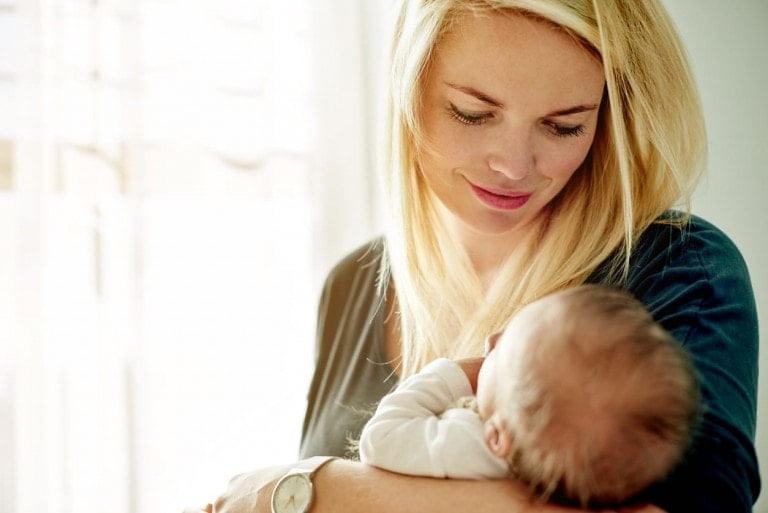Research shows that most new moms experience worrying and perhaps scary thoughts in the postpartum period.1 It’s not uncommon for new moms to doubt their ability to look after a brand-new baby. After all, they have never done it before, they are sleep deprived, their hormones are awry, and they are adjusting to a new role and life. However, for some women, these everyday thoughts and worries focused on the well-being of their baby can become concerning.
Scary Thoughts vs. Normal Thoughts
Most scary thoughts center on worries that go away. Like if you worry about dropping your baby while walking down the stairs. Because of this thought, you instinctively hold them tighter and tread more carefully but continue your day. This is likely to be a normal thought. However, it has the potential to be uncomfortable or distressing. These thoughts could be extreme worries and fears and signs of postpartum anxiety.2 They are often centered on the health and safety of the baby.2
Some of these everyday, scary thoughts new moms have include:
- I don’t love my baby.
- I hate breastfeeding.
- Am I a good mother?
- What if my baby rolls off the changing table and gets hurt?
- I don’t feel connected to my child.
- I feel regret about having this baby.
- I miss my old life.
However, some more concerning thoughts, sometimes called intrusive thoughts, are unwanted, repetitive, and seemingly come out of nowhere. These become concerning when they focus on intentionally harming the baby or yourself like:
- I want to hurt my baby.
- I want to die.
While scary, these thoughts don’t mean you’ll act on them. There are other elements of these thoughts to be aware of to determine if they are concerning. Mainly if they are chaotic, violent, or gruesome, as well as how much distress the thought causes and how much impact it has on your ability to function. Everyday worries will allow you to get on with your day once the initial thought has cleared. Scary thoughts can hang around, become repetitive or start to influence how you behave and act.
Scary Thoughts Don’t Make You a Bad Mom
Moms who experience these intrusive, scary thoughts are usually mortified or feel shameful or guilty for having them. You have just spent nine months patiently waiting to meet your little person, and you love them more than anything. To think about them being harmed, or worse, having thoughts about harming them yourself, can be disturbing. So much so that many women don’t reach out for support because they feel guilty or embarrassed.
But I want to be clear about one thing. Having scary or intrusive thoughts — not just general worried thoughts that go away and don’t interfere with your life — about your child does not make you a bad parent. Because you feel so disturbed by these thoughts, it can help you see them for what they are – just thoughts – and not a desire to harm your child. However, these thoughts may mean that you are experiencing postpartum depression, anxiety, or obsessive-compulsive disorder (OCD) symptoms. Know that none of these diagnoses or having intrusive thoughts mean you are a terrible mom. But they do suggest that seeking support is essential.
What Kind of Supports are There?
First, reach out to your trusted health professional or family doctor to talk about how you are feeling and explore the thoughts you have been experiencing. Even if your intrusive thoughts aren’t coupled with an official diagnosis of any postpartum condition, counseling, support, or even exploring medication with your doctor could be an excellent place to start.
You can also call for immediate help if you are in need:
- National Suicide Prevention Lifeline: 1-800-273-8255
- Suicide Prevention Hotline:1-800-SUICIDE
- National Postpartum Depression Warmline: 1-800-PPD-MOMS
Help is Also Online
Some excellent websites also break down the stigma of new moms’ scary thoughts like these, including the Speak The Secret campaign through The Postpartum Stress Center (view here). The campaign focuses on spreading the hashtag #speakthesecret and opening up conversations where women can share their scary thoughts anonymously. The hope is that once they have broken down the barrier of saying their thoughts aloud, they can share their thoughts with loved ones and trusted health professionals. There are also local, national, and international support services that parents can call or find online about postpartum health and well-being, including Postpartum Support International (view here).
You are not alone. While your thoughts might be scary, it doesn’t mean you will act on them. However, if you are worried or disturbed by these thoughts or feel you want to act on them, it’s essential to know that it is not a weakness or vulnerability to reach out. It shows you are strong and means you can access the support you need to get through this challenging time.































